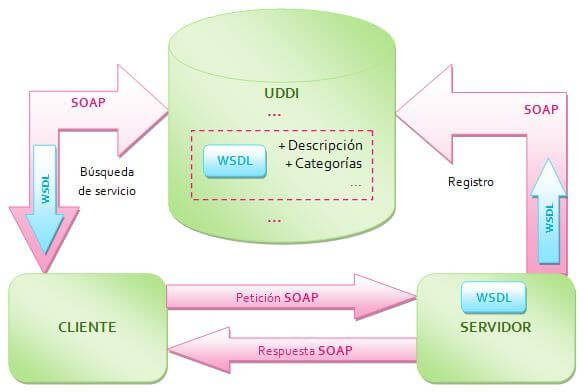Resumen de contenidos
One way to achieve better results 🤓 for your company is to increase your performance and that of your workers ✅. How to do it is the topic we will address today. stay, read on! 🚀
Nowadays, there are a wide variety of applications or APIs to improve the performance of companies and their workers. In addition, the vast majority of recognition websites such as Microsoft, Facebook, … use web services. However, not all companies know how to use them correctly or simply do not have them well synchronized with the rest of the applications in their web service.
In order for the company to make these tools profitable, the ideal is to have all the means of communication (telephone, SMS, email, WhatsApp, CRM, …) connected to a single Web Service. To do this, you must have modular services that allow you to interconnect all the API services available to companies. But, before getting into the subject, let’s explain several concepts such as: web service, API and interface.
Web Service:
It is a communication system between two electrical devices connected to a network through the use of protocols and standards to exchange data between applications or systems.
Api (Application Programming Interface or Application Programming Interface):
It is a set of procedures and functions intended to be used through a software.
Interface:.
It is the way in which two or more services or applications communicate with each other.
For that reason, we have a web system that allows you to connect together all the APIs that the company needs to offer a quality service to businesses and increase their profitability, regardless of whether you already have some of the services.
Next, we are going to analyze in depth what a Web Service consists of, what types of APIs companies can have and the benefits that companies obtain with its correct configuration.
What is Web Service?
Getting into the subject, the web service consists of integrating web applications in a standardized way through the use of internet protocols in XLM format. What is XLM? It is a language created and used by the W3C to describe data and makes it possible to describe, transmit, validate and interpret data between applications.
According to the W3C: «A web service is a software system designed to support machine-to-machine interaction, over a network, in an interoperable manner.» Furthermore, it is based on 3 technologies created by several companies and organizations such as IBM and Microsoft, with a specific function and utility. What are they?
- SOAP (Simple Object Access Protocol): is a protocol written in XML that allows information to be exchanged between applications by previously defining what is sent and how. Its purpose is to allow access to a Web service and is responsible for the transformation of data.
- WSDL (Web Services Description Language): describes the Web services available and how they are accessed through the XLM language.
- UDDI (Universal Description, Discovery and Integration): describes, publishes and finds web services in XLM language. It is a web service directory interface described in WSDL and communicated via SOAP.
The main advantages that Web Services bring to businesses are:
- They provide interoperability between different software applications no matter where they are installed or their properties.
- They promote standards and protocols by facilitating access to their content and operation.
- Enable the integration of different services and software regardless of their geolocation.
- Facilitates interaction between different web services.
- Decreases complexity by having an interface that provides the service.
- It can be created quickly and easily thanks to toolkits from vendors such as IBM or Microsoft.
- SOAP technology is supported by all the companies in the software industry.
- …
What is an API?
As we have indicated before, an API reproduces the communication functions of software. And it consists of providing a set of general-purpose development and integration functions that avoid programming everything from scratch, saving time and money. The main benefits are: flexibility, simplicity of use, design and management of applications, …
As business needs are constantly changing, APIs are evolving and therefore cloud native apps are developing rapidly to remain competitive. These cloud native apps are a set of small, independent, low-connected services that allow new applications to be designed and existing ones to be optimized quickly, and then connected together.
In other words, APIs provide access to resources while maintaining data security and control. In addition, we can find 3 types of policies regarding data access with APIs, and they are:
- Private: access is internal, offering greater control to companies.
- Partner: they are shared between specific partners and offer additional revenue streams, without compromising the quality of the APIs.
- Public: no restrictions on access, allows other companies to develop APIs compatible with your company’s APIs.
On the other hand, it is worth mentioning that, for example, APIs that are proprietary or partner APIs must have an API KEY. It is a login created in the API to be able to access the account.

Why is it important to have a Web Service in companies?
Starting from the assumption that every Web Service is an API and every API is not a Web Service, we are going to study the importance of having a Web Service in your company. To begin with, let’s take a look at everything it offers your company:
- It offers external access from the Internet
- It allows interoperability.
- Uses Internet standards.
- Supports any language.
- Supports any distributed component infrastructure.
- Centralizes data regardless of whether it is distributed or not in the Web Service.
- Allows access from any platform.
- It can be connected with any communication system (telephone, SMS, WhatsApp, CRM, …).
- It allows to interconnect all the services.
- ….
But, to be able to enjoy all this, the most advisable thing is to have modular services that allow to connect the services of the companies-customers with those of the teleoperator companies.
For example, let’s suppose that a company only has the CRM service, so we would connect it to our telephone system to increase its profitability. Or if the case were the opposite, the company has a telephone system, but does not have a CRM system for better management of communication channels.
This communication system, such as Web Service or APIs, are increasingly implemented in companies. As we have seen, they offer great advantages to companies when working to offer a quality service to their customers and improve the productivity of workers.
In Gesditel we are always providing recommendations to improve the productivity of your company taking advantage of the resources you have. But of course, always ensuring the security of your company’s and your customers’ data without losing the quality of the services.
If you want to know more information about how to improve your company with the modular services of Web Services, just contact us through any of our communication channels or through our contact form.
